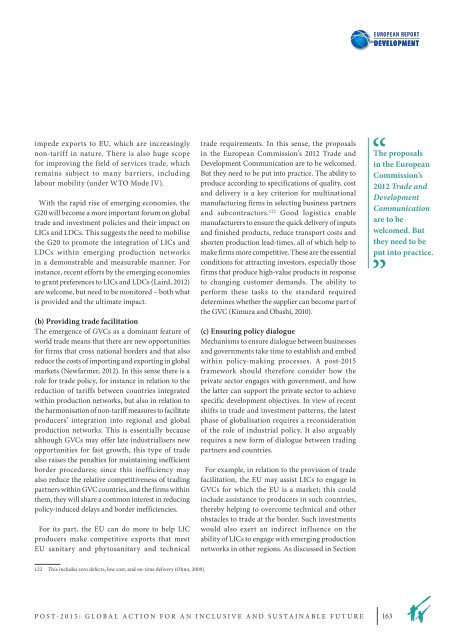Post 2015: Global Action for an Inclusive and Sustainable Future
Post 2015: Global Action for an Inclusive and Sustainable Future
Post 2015: Global Action for an Inclusive and Sustainable Future
You also want an ePaper? Increase the reach of your titles
YUMPU automatically turns print PDFs into web optimized ePapers that Google loves.
impede exports to Eu, which are increasingly<br />
non-tariff in nature. there is also huge scope<br />
<strong>for</strong> improving the field of services trade, which<br />
remains subject to m<strong>an</strong>y barriers, including<br />
labour mobility (under Wto mode Iv).<br />
With the rapid rise of emerging economies, the<br />
G20 will become a more import<strong>an</strong>t <strong>for</strong>um on global<br />
trade <strong>an</strong>d investment policies <strong>an</strong>d their impact on<br />
lIcs <strong>an</strong>d lDcs. this suggests the need to mobilise<br />
the G20 to promote the integration of lIcs <strong>an</strong>d<br />
lDcs within emerging production networks<br />
in a demonstrable <strong>an</strong>d measurable m<strong>an</strong>ner. For<br />
inst<strong>an</strong>ce, recent ef<strong>for</strong>ts by the emerging economies<br />
to gr<strong>an</strong>t preferences to lIcs <strong>an</strong>d lDcs (laird, 2012)<br />
are welcome, but need to be monitored – both what<br />
is provided <strong>an</strong>d the ultimate impact.<br />
(b) Providing trade facilitation<br />
the emergence of Gvcs as a domin<strong>an</strong>t feature of<br />
world trade me<strong>an</strong>s that there are new opportunities<br />
<strong>for</strong> firms that cross national borders <strong>an</strong>d that also<br />
reduce the costs of importing <strong>an</strong>d exporting in global<br />
markets (newfarmer, 2012). In this sense there is a<br />
role <strong>for</strong> trade policy, <strong>for</strong> inst<strong>an</strong>ce in relation to the<br />
reduction of tariffs between countries integrated<br />
within production networks, but also in relation to<br />
the harmonisation of non-tariff measures to facilitate<br />
producers’ integration into regional <strong>an</strong>d global<br />
production networks. this is essentially because<br />
although Gvcs may offer late industrialisers new<br />
opportunities <strong>for</strong> fast growth, this type of trade<br />
also raises the penalties <strong>for</strong> maintaining inefficient<br />
border procedures; since this inefficiency may<br />
also reduce the relative competitiveness of trading<br />
partners within Gvc countries, <strong>an</strong>d the firms within<br />
them, they will share a common interest in reducing<br />
policy-induced delays <strong>an</strong>d border inefficiencies.<br />
For its part, the Eu c<strong>an</strong> do more to help lIc<br />
producers make competitive exports that meet<br />
Eu s<strong>an</strong>itary <strong>an</strong>d phytos<strong>an</strong>itary <strong>an</strong>d technical<br />
122 this includes zero defects, low cost, <strong>an</strong>d on-time delivery (ohno, 2009).<br />
trade requirements. In this sense, the proposals<br />
in the Europe<strong>an</strong> commission’s 2012 trade <strong>an</strong>d<br />
Development communication are to be welcomed.<br />
but they need to be put into practice. the ability to<br />
produce according to specifications of quality, cost<br />
<strong>an</strong>d delivery is a key criterion <strong>for</strong> multinational<br />
m<strong>an</strong>ufacturing firms in selecting business partners<br />
<strong>an</strong>d subcontractors. 122 Good logistics enable<br />
m<strong>an</strong>ufacturers to ensure the quick delivery of inputs<br />
<strong>an</strong>d finished products, reduce tr<strong>an</strong>sport costs <strong>an</strong>d<br />
shorten production lead-times, all of which help to<br />
make firms more competitive. these are the essential<br />
conditions <strong>for</strong> attracting investors, especially those<br />
firms that produce high-value products in response<br />
to ch<strong>an</strong>ging customer dem<strong>an</strong>ds. the ability to<br />
per<strong>for</strong>m these tasks to the st<strong>an</strong>dard required<br />
determines whether the supplier c<strong>an</strong> become part of<br />
the Gvc (Kimura <strong>an</strong>d obashi, 2010).<br />
(c) Ensuring policy dialogue<br />
mech<strong>an</strong>isms to ensure dialogue between businesses<br />
<strong>an</strong>d governments take time to establish <strong>an</strong>d embed<br />
within policy-making processes. a post-<strong>2015</strong><br />
framework should there<strong>for</strong>e consider how the<br />
private sector engages with government, <strong>an</strong>d how<br />
the latter c<strong>an</strong> support the private sector to achieve<br />
specific development objectives. In view of recent<br />
shifts in trade <strong>an</strong>d investment patterns, the latest<br />
phase of globalisation requires a reconsideration<br />
of the role of industrial policy. It also arguably<br />
requires a new <strong>for</strong>m of dialogue between trading<br />
partners <strong>an</strong>d countries.<br />
For example, in relation to the provision of trade<br />
facilitation, the Eu may assist lIcs to engage in<br />
Gvcs <strong>for</strong> which the Eu is a market; this could<br />
include assist<strong>an</strong>ce to producers in such countries,<br />
thereby helping to overcome technical <strong>an</strong>d other<br />
obstacles to trade at the border. Such investments<br />
would also exert <strong>an</strong> indirect influence on the<br />
ability of lIcs to engage with emerging production<br />
networks in other regions. as discussed in Section<br />
poSt-<strong>2015</strong>: <strong>Global</strong> actIon For <strong>an</strong> IncluSIvE <strong>an</strong>D SuStaInablE FuturE<br />
The proposals<br />
in the Europe<strong>an</strong><br />
Commission’s<br />
2012 Trade <strong>an</strong>d<br />
Development<br />
Communication<br />
are to be<br />
welcomed. But<br />
they need to be<br />
put into practice.<br />
163

















